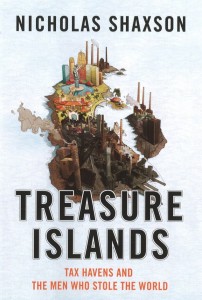Small Island ‘Tax Haven’ Stereotype ‘A Big Lie’
 Large countries such as the US and United Kingdom are as much responsible for “distorting markets” as smaller but more widely-criticised “tax havens” such as Bermuda, British author Nicholas Shaxson told OffShore Alert this week.
Large countries such as the US and United Kingdom are as much responsible for “distorting markets” as smaller but more widely-criticised “tax havens” such as Bermuda, British author Nicholas Shaxson told OffShore Alert this week.
Mr. Shaxson, author of the recently published UK bestseller “Treasure Islands, Tax Havens and the Men Who Stole the World”, was interviewed by the investigative website run by former Bermuda financial journalist David Marchant.
The author said while off-shore financial centres like Bermuda, the Cayman Islands and the British Virgin Islands are often singled out for criticism they are simply extensions of a worldwide financial system ”providing one set of rules for wealthy elites and insiders, and another set for the rest of us.”
“Tax havens are popularly supposed to be small, palm-fringed islands, with Monaco and Switzerland thrown in for good measure,” said Mr. Shaxson, an Associate Fellow of the Royal Institute of International Affairs and a consultant for global watchdog organisation Tax Justice Network. “This stereotype is the big lie, which helps explain why the offshore phenomenon has been so misunderstood, and assumed to be a small, exotic side show.
“The truth is that the world’s biggest tax havens include some of the world’s biggest economies – the United States, United Kingdom, Luxembourg, Ireland, and so on. Tax havens are at the heart of the global economy. That’s what we need to now understand.
“Tax havens are corrupting international capitalism by essentially providing one set of rules for wealthy elites and insiders, and another set for the rest of us.
“They are distorting markets. Multinationals get to out-compete more nationally-based smaller firms that can’t access the same abusive tax strategies. But this has nothing at all to do with the healthy competition in free markets that we read about in our economics text books. This is wasteful, inefficient competition: the result is not better products in the market place, but instead a transfer of wealth from taxpayers to capital owners. There is nothing ‘efficient’ about having one set of rules for big multinationals, and another set for smaller companies.”
Mr. Shaxson references Bermuda in his book, published last month, and in the past has said the island’s overreliance on its financial services sector provides a case study in the vulnerabilities of “tax haven economies.”
“The tensions in Bermuda highlight one of several reasons why tax haven economies –- especially small islands with little else to fall back on –- are inherently unstable,” he said at the onset of the global recession in 2008. “Often the financial sector becomes dominant in an island economy the result is political ‘capture’ by the lobbyists and cheerleaders for financial services.
“The dominant sector also sucks skilled personnel out of the others, eroding them further; and by raising prices locally, people in other sectors are effectively poorer and further marginalised.
“The dominant sector thus becomes yet more dominant. Again, this is a bit like like mineral-rich economies afflicted by the Resource Curse, where the natural resource sectors crowd out other productive sectors like agriculture, manufacturing or tourism, leaving politicians to rail impotently about the receding dream of economic diversification.”
“Like oil-dependent economies vulnerable to world oil prices, island tax haven economies are heavily exposed to boom-bust swings in international finance; if the current international ‘credit crunch’ proves to be as deep and durable as some fearm, many havens face a bitter future.”
Mr. Shaxson will be expanding on his views of “tax havens” at the 9th Annual OffshoreAlert Conference, which will be held at The Ritz-Carlton, South Beach in Miami Beach, Florida on April 4-6, 2011.
He will participate in a session entitled “OFCs or Tax Havens: Good or Bad for the Global Economy”. Others, including former Cayman Islands Monetary Authority Chairman Tim Ridley, will argue that offshore financial centres actually benefit the international financial system.

